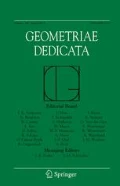Abstract
Amos Nevo established the pointwise ergodic theorem in \(L^p\) for measure-preserving actions of \(\mathrm {PSL}_2(\mathbb {R})\) on probability spaces with respect to ball averages and every \(p>1\). This paper shows by explicit example that Nevo’s Theorem cannot be extended to \(p=1\).




Similar content being viewed by others
References
Beardon, A.F.: The Geometry of Discrete Groups, Volume 91 of Graduate Texts in Mathematics. Springer, New York (1995). (Corrected reprint of the 1983 original)
Bachir Bekka, M., Mayer, M.: Ergodic Theory and Topological Dynamics of Group Actions on Homogeneous Spaces, Volume 269 of London Mathematical Society Lecture Note Series. Cambridge University Press, Cambridge (2000)
Buser, P.: Geometry and Spectra of Compact Riemann Surfaces, Volume 106 of Progress in Mathematics. Birkhäuser Boston Inc., Boston (1992)
Gorodnik, A., Nevo, A.: The Ergodic Theory of Lattice Subgroups, Volume 172 of Annals of Mathematics Studies. Princeton University Press, Princeton (2010)
Lindenstrauss, E.: Pointwise theorems for amenable groups. Invent. Math. 146(2), 259–295 (2001)
Margulis, G.A., Nevo, A., Stein, E.M.: Analogs of Wiener’s ergodic theorems for semisimple Lie groups. II. Duke Math. J. 103(2), 233–259 (2000)
Nevo, A.: Harmonic analysis and pointwise ergodic theorems for noncommuting transformations. J. Am. Math. Soc. 7(4), 875–902 (1994)
Nevo, A.: Pointwise ergodic theorems for radial averages on simple Lie groups. I. Duke Math. J. 76(1), 113–140 (1994)
Nevo, A.: Pointwise ergodic theorems for radial averages on simple Lie groups. II. Duke Math. J. 86(2), 239–259 (1997)
Nevo, A.: Pointwise ergodic theorems for actions of groups. In: Hasselblatt, B., Katok, A. (eds.) Handbook of Dynamical Systems, vol. 1B, pp. 871–982. Elsevier B. V., Amsterdam (2006)
Nevo, A., Stein, E.M.: A generalization of Birkhoff’s pointwise ergodic theorem. Acta Math. 173(1), 135–154 (1994)
Nevo, A., Stein, E.M.: Analogs of Wiener’s ergodic theorems for semisimple groups. I. Ann. Math. (2) 145(3), 565–595 (1997)
Ornstein, D.: On the pointwise behavior of iterates of a self-adjoint operator. J. Math. Mech. 18, 473–477 (1968/1969)
Tao, T.: Failure of the \(L^1\) pointwise and maximal ergodic theorems for the free group. Forum Math. Sigma 3, e27, 19 (2015)
Author information
Authors and Affiliations
Corresponding author
Additional information
Publisher's Note
Springer Nature remains neutral with regard to jurisdictional claims in published maps and institutional affiliations.
L. Bowen: Supported in part by NSF Grant DMS-1500389. P. Burton: Supported by an R.H. Bing Fellowship.
Rights and permissions
About this article
Cite this article
Bowen, L., Burton, P. Failure of the \(L^1\) pointwise ergodic theorem for \(\mathrm {PSL}_2(\mathbb {R})\). Geom Dedicata 207, 61–80 (2020). https://doi.org/10.1007/s10711-019-00487-5
Received:
Accepted:
Published:
Issue Date:
DOI: https://doi.org/10.1007/s10711-019-00487-5



